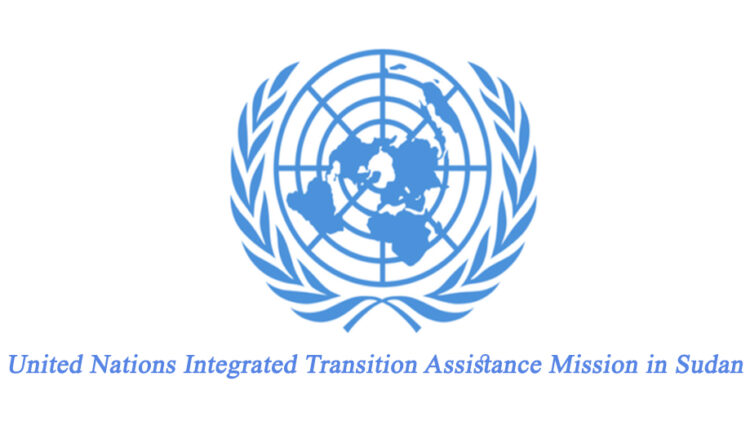RULE OF LAW OFFICER – UNITAMS
Job Description
| Department/Office: | United Nations Integrated Transition Assistance Mission in Sudan |
| Posting Title: | Rule of Law Officer, P3 |
| Job Code Title: | RULE OF LAW OFFICER |
| Duty Station: | KHARTOUM |
| Posting Period: | 27 May 2021 – 25 June 2021 |
| Job Opening Number: | 21-Rule of Law-UNITAMS-156454-R-Khartoum (M) |
| Staffing Exercise | N/A |
Org. Setting and Reporting
The position is located in the United Nations Integrated Transition Assistance Mission in Sudan (UNITAMS). The United Nations Security Council adopted resolution 2524 (2020) authorizing the mandate of UNITAMS which is to assist the political transition, progress towards democratic governance, in the protection and promotion of human rights, and sustainable peace; support peace processes and implementation of future peace agreements; assist peacebuilding, civilian protection and rule of law, in particular in Blue Nile and South Kordofan (the Two Areas) and Darfur; and support the mobilisation of economic and development assistance and coordination of humanitarian assistance. The position is based in Khartoum within the Office of Protection of Civilians. The incumbent will report to the Senior Rule of Law Officer.
Responsibilities
Within the delegated authority, the Rule of Law Officer will be responsible for the following duties:
•contributes to the implementation of the UNITAMS rule of law mandate, in particular with information gathering, analysis and advice, retaining working level contact with relevant national rule of law counterparts and international partners and provide relevant analysis for programming and decision making.
•design, draft and support capacity building programmes for rule of law national counterparts and engage at the technical level on rule of law coordination. The incumbent will advise on and support the preparation of assessment reports, reports addressing complex strategic and operational issues, policy documents and guidelines.
•coordinate in implementing key components for a policy framework related to the rule of law and strengthening of the criminal justice system and related institutions in Sudan, while implementing and advising on the legal framework institutional reform of the judiciary, prosecution service, and rule of law agencies and legal representations or aid.
•provides policy and operational advice to Senior/Chief Rule of Law, assists in programming related activities at the national level and handles a wider range of multi-disciplinary, complex and often sensitive and/or conflicting matters involving issues pertaining to criminal justice policy, and reform of the judicial system and related institutions.
•provides innovative technical advice and assistance to local commissions and other stake holders within the international community located in Sudan to ensure cohesive and coordinated programme delivery.
•contributes to the development of the rule of law strategic plan and policymaking framework in the context of the mission’s mandate and assist in the day-to-day coordination of key activities with other mission components and UN entities.
•advises on and prepares complex legal research and analysis and outputs, such as work unit reports and assessments, policy documents and guidelines, briefings, etc.
•participates in legislative reviews and drafts commentaries and other relevant documents.
•represents the mission and serves on various standing boards and committees, as required.
•supports and participates in national level coordination, planning and/or reform processes and donor coordination, to include supporting the completion of major reviews of the justice sector and the development of long-term national strategic plans.
•provides training to junior staff under her/his supervision.
•ensures effective knowledge management and information sharing, including developing a culture of respect for, and inclusion of, local actors in all judicial and legal system initiatives.
•assist in identifying, establishing and maintaining contacts and partnerships with other actors (national and international) in assigned areas of responsibility with a view to pursuing work programme objectives and ensuring participation in and effective integration of ideas in the planning and implementation of judicial affairs activities.
•performs programmatic and administrative tasks necessary for the functioning of work unit, including contributing to the preparation of budgets, reporting on performance and results, managing and evaluating staff performance, job interviewing and evaluation of candidates.
•capacity to adopt a strategic approach to the development of a justice system.
•demonstrates ability to provide strategic normative advice on justice and anti-corruption issues related to policy reforms, ability to deliver complex legal analysis papers and deliver briefings.
•performs other related duties as required.
Competencies
Professionalism:
-Knowledge of legal and judicial system issues, as well as relevant international justice and human rights standards, and transitional justice
-Shows pride in work and in achievements
-Demonstrates professional competence and mastery of subject matter
-Is conscientious and efficient in meeting commitments, observing deadlines and achieving results
-Is motivated by professional rather than personal concerns; shows persistence when faced with difficult problems or challenges; remains calm in stressful situations
Communication:
-Speaks and writes clearly and effectively
-Listens to others, correctly interprets messages from others and responds appropriately
-Asks questions to clarify, and exhibits interest in having two-way communication
-Tailors language, tone, style and format to match the audience
-Demonstrates openness in sharing information and keeping people informed
Planning & Organizing:
-Develops clear goals that are consistent with agreed strategies
-Identifies priority activities and assignments; adjusts priorities as required
-Allocates appropriate amount of time and resources for completing work
-Foresees risks and allows for contingencies when planning
-Monitors and adjusts plans and actions as necessary
-Uses time efficiently
Client Orientation:
-Considers all those to whom services are provided to be “clients ” and seeks to see things from clients’ point of view
-Establishes and maintains productive partnerships with clients by gaining their trust and respect
-Identifies clients’ needs and matches them to appropriate solutions
-Monitors ongoing developments inside and outside the clients’ environment to keep informed and anticipate problems
-Keeps clients informed of progress or setbacks in projects
-Meets timeline for delivery of products or services to client
Education
An advanced university degree (Master’s degree or equivalent) in law is required. A first-level university degree in any field, with a bar qualification or equivalent, in combination with two additional years of relevant legal experience may be accepted in lieu of an advanced university degree.
Work Experience
- A minimum of five years of progressively responsible professional experience in implementing law reforms and overseeing the implementation of national policies and plans in rule of law and security matters is required.
- Experience as a practicing lawyer, prosecutor, judge, legal academic, legal consultant, or adviser in the field of justice is required; a minimum of three years of experience providing technical assistance for the development or reform of legal and judicial institutions in a transitional, developmental or post-conflict setting, outside the applicant’s country of nationality.
- A minimum of two years of experience in providing services in the field of Rule of Law or related areas to or in a United Nations special political mission or a comparable international organization is required.
- Experience in working with Sharia law; informal justice mechanisms; international criminal justice and anti-corruption issues is required.
- Experience in project and program management and design is desirable.
- Experience in working on rule of law issues in Sudan is desirable.
Languages
Fluency in spoken and written English is required. Knowledge of a second UN language is an advantage. Fluency in written and spoken Arabic is desirable.
Assessment
Evaluation of qualified candidates may include an assessment exercise which may be followed by a competency-based interview.
Special Notice
Applying to this job opening carries an expectation to accept the offer, if selected. The United Nations Secretariat is committed to achieving 50/50 gender balance in its staff. Female candidates are strongly encouraged to apply for this position. In this context, all staff are expected to move periodically to new functions in their careers in accordance with established rules and procedures. An impeccable record for integrity and professional ethical standards is essential. This is a Position Specific Job Opening (PSJO), where successful candidates would be placed on the roster following a review by a United Nations Central Review Body.
Please note that due to the ongoing situation with COVID-19 and the travel restrictions imposed by national authorities, selected candidates may be required to start the assignment/appointment remotely, in agreement with the hiring manager, and until further notice.
United Nations Considerations
According to article 101, paragraph 3, of the Charter of the United Nations, the paramount consideration in the employment of the staff is the necessity of securing the highest standards of efficiency, competence, and integrity. Candidates will not be considered for employment with the United Nations if they have committed violations of international human rights law, violations of international humanitarian law, sexual exploitation, sexual abuse, or sexual harassment, or if there are reasonable grounds to believe that they have been involved in the commission of any of these acts. The term “sexual exploitation” means any actual or attempted abuse of a position of vulnerability, differential power, or trust, for sexual purposes, including, but not limited to, profiting monetarily, socially or politically from the sexual exploitation of another. The term “sexual abuse” means the actual or threatened physical intrusion of a sexual nature, whether by force or under unequal or coercive conditions. The term “sexual harassment” means any unwelcome conduct of a sexual nature that might reasonably be expected or be perceived to cause offence or humiliation, when such conduct interferes with work, is made a condition of employment or creates an intimidating, hostile or offensive work environment, and when the gravity of the conduct warrants the termination of the perpetrator’s working relationship. Candidates who have committed crimes other than minor traffic offences may not be considered for employment.
Due regard will be paid to the importance of recruiting the staff on as wide a geographical basis as possible. The United Nations places no restrictions on the eligibility of men and women to participate in any capacity and under conditions of equality in its principal and subsidiary organs. The United Nations Secretariat is a non-smoking environment.
The paramount consideration in the appointment, transfer, or promotion of staff shall be the necessity of securing the highest standards of efficiency, competence, and integrity. By accepting an offer of appointment, United Nations staff members are subject to the authority of the Secretary-General and assignment by him or her to any activities or offices of the United Nations in accordance with staff regulation 1.2 (c). In this context, all internationally recruited staff members shall be required to move periodically to discharge new functions within or across duty stations under conditions established by the Secretary-General.
Applicants are urged to follow carefully all instructions available in the online recruitment platform, inspira. For more detailed guidance, applicants may refer to the Manual for the Applicant, which can be accessed by clicking on “Manuals” hyper-link on the upper right side of the inspira account-holder homepage.
The evaluation of applicants will be conducted on the basis of the information submitted in the application according to the evaluation criteria of the job opening and the applicable internal legislations of the United Nations including the Charter of the United Nations, resolutions of the General Assembly, the Staff Regulations and Rules, administrative issuances and guidelines. Applicants must provide complete and accurate information pertaining to their personal profile and qualifications according to the instructions provided in inspira to be considered for the current job opening. No amendment, addition, deletion, revision or modification shall be made to applications that have been submitted. Candidates under serious consideration for selection will be subject to reference checks to verify the information provided in the application.
Job openings advertised on the Careers Portal will be removed at 11:59 p.m. (New York time) on the deadline date.
No Fee
THE UNITED NATIONS DOES NOT CHARGE A FEE AT ANY STAGE OF THE RECRUITMENT PROCESS (APPLICATION, INTERVIEW MEETING, PROCESSING, OR TRAINING). THE UNITED NATIONS DOES NOT CONCERN ITSELF WITH INFORMATION ON APPLICANTS’ BANK ACCOUNTS.


